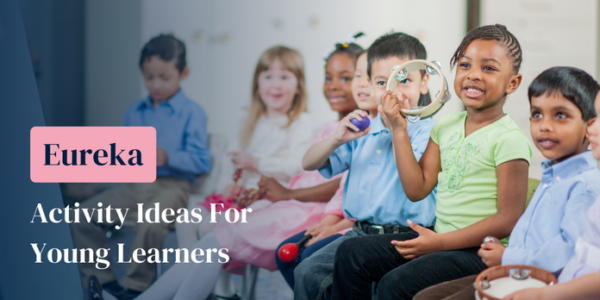Learning through play is a powerful educational approach, particularly for young learners. It’s not just about having fun; it’s about encouraging children to explore the world around them at their own level and pace. This helps them to develop their cognitive, physical and communicative skills. Through play, young learners can unleash their creativity, engage in meaningful interaction, regulate their emotions, build resilience and enhance their wellbeing and language abilities. It allows them to share, collaborate and experiment within a safe and nurturing environment.
Before we look at some activity ideas and play activities that can be incorporated into your young learner classroom, let’s first look at two different types of play activities: child-led and adult-led.
Types of play activities
Child-led activities: In child-led activities, children lead the way while adults play a more observant role. Adults only step in to deepen or consolidate learning when opportunities arise. These types of activities are sparked by the child’s interests, allowing them to explore concepts and skills at their own pace.
Adult-led activities: These are more structured experiences designed by the teacher, to guide learning towards specific outcomes. While there’s a clear objective, there’s still plenty of room for creativity and discovery.
Now, let’s look at different play-based activities you could include in your young learner classroom.
Examples of play activities
1. Sand, water and clay play
- Type: Both child-led and adult-led
- Objectives: Develop motor skills, understand states of matter, encourage creativity
- Skills developed: Fine motor skills, sensory exploration, imaginative play
- Variations: Creating sculptures, making patterns, mixing colours, discovering the effects of water on sand and clay
2. Roleplays
- Type: Mainly child-led, with adult facilitation
- Objectives: Develop social skills, understanding of various roles, understanding of conversation management and turn-taking
- Skills developed: Language skills, empathy, negotiation, collaboration, communication, emotional intelligence
- Variations: Setting up scenarios like shops, hospitals or schools, where children can take on different roles
3. Outdoor exercises and games
- Type: Adult-led, with opportunities for child-led variations
- Objectives: Enhance physical coordination, strength and social skills like turn-taking and cooperation
- Skills developed: Motor skills, teamwork, following directions
- Variations: Organised or team sports, treasure hunts, relay races
4. Music and rhythm
- Type: Both child-led and adult-led
- Objectives: Develop auditory skills, sense of rhythm, and expressive abilities
- Skills developed: Listening skills, creativity, coordination
- Variations: Making instruments from everyday items, conducting a ‘kitchen orchestra’ (where students bring in items from home), participating in sing-alongs
You can learn more about using music in the classroom here.
5. Building and construction
- Type: Both child-led and adult-led
- Objectives: Foster creativity, problem-solving, and basic mathematical concepts
- Skills developed: Spatial awareness, motor skills, early maths skills
- Variations: Challenges to build the tallest tower, recreate landmarks they know, or design new structures
6. Exploring the natural world
- Type: Both child-led and adult-led
- Objectives: Stimulate curiosity, develop a sense of empathy and environmental awareness
- Skills developed: Observation, research skills, respect for nature
- Variations: Treasure hunts, garden projects, mini-safaris around different outdoor areas, drawing favourite plants, flowers or insects
Additional ideas for play activities
Storytelling circles
- Encourage young learners to create and share their own stories. This fosters imagination, language development and listening skills.
- This activity can be both child-led, where children dictate the direction and content of the stories, and adult-led, where educators introduce story prompts or themes.
Art and collage
- Provide materials for young learners to express themselves through art, allowing for both individual and collaborative projects. This encourages creativity, motor skills development and emotional expression.
Integrating learning through play blends fun with fundamental skill development. You can create a rich, engaging, and supportive learning environment that fosters young learners’ growth across multiple domains, with both child-led and adult-led activities. Encouraging play is not just about making learning enjoyable; it’s about preparing children for a world where creativity, problem-solving and collaboration are key.
What other play activities would you add? Share your ideas below!
You can learn more about nurturing your students’ creativity and imagination here.
